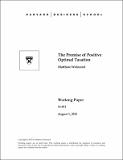| dc.contributor.author | Weinzierl, Matthew Charles | |
| dc.date.accessioned | 2014-01-13T14:38:52Z | |
| dc.date.issued | 2014-01-13 | |
| dc.identifier.citation | Weinzierl, Matthew. "The Promise of Positive Optimal Taxation." Harvard Business School Working Paper, No. 14-013, August 2013. | en_US |
| dc.identifier.uri | http://nrs.harvard.edu/urn-3:HUL.InstRepos:11508221 | |
| dc.description.abstract | At the heart of modern optimal tax research is the assumption that the objective of taxation is Utilitarian. I present new survey evidence that most people disagree with this assumption, preferring tax policies based at least in part on a classic alternative objective: the principle of Equal Sacrifice. I generalize the standard model to accommodate this preference for a mixed objective, proposing a method by which to make disparate criteria commensurable while respecting Pareto efficiency. Then, I show that optimal policy in this generalized model, calibrated to the survey evidence and U.S. microdata, quantitatively matches several features of existing tax policy that are incompatible in the conventional model but widely endorsed in reality, including the coexistence of substantial redistribution and limited tagging. Together, these findings demonstrate the potential of a positive theory of optimal taxation. | en_US |
| dc.language.iso | en_US | en_US |
| dash.license | OAP | |
| dc.title | The Promise of Positive Optimal Taxation | en_US |
| dc.type | Research Paper or Report | en_US |
| dc.description.version | Author's Original | en_US |
| dc.relation.journal | Harvard Business School working paper series # 14-013 | en_US |
| dash.depositing.author | Weinzierl, Matthew Charles | |
| dc.date.available | 2014-01-13T14:38:52Z | |
| dash.contributor.affiliated | Weinzierl, Matthew | |


